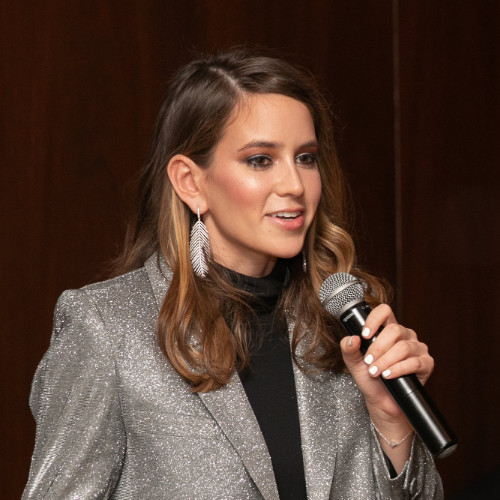A Conversion Conversation with Discovery’s Alexandra Resnick
I recently spoke to Alexandra about her experience living in NYC, running Experiments, and transitioning jobs during the COVID-19 pandemic as well as her least favourite NYC sports team (spoiler alert: she plays it safe).
Rommil: Hi Alexandra, it’s so nice to chat again! How have you been since the last time we’ve chatted?
Alexandra: Hey Rommil! I’m doing well, and thanks again for the opportunity. I’m still in New York City but have moved onto a new opportunity since we last spoke. I’m excited to tell you more about it.
For the benefit of our readers, could you tell us about yourself and what you do today?
Sure! I’m originally from Chicago and moved to New York City after graduating college. I knew NYC was the place to launch my career, and that I wanted to dive into the world of media and communications. I enrolled in a master’s program focused on digital communications and advertising to help kickstart my career while working in business development at a small digital agency. The master’s program helped me understand the importance of measurement and performance, and I knew I wanted my next job opportunity to be focused within those functions of marketing and advertising. I made a pivot and joined a web analytics and CRO group in the edtech space, testing and optimizing digital touchpoints on a growing team. After a little over three years at that last firm, I recently jumped over to a global media company working on testing and optimization for some of their direct-to-consumer products. It has been quite a journey!
Outside of work, I enjoy exploring the city on my bike, listening to music, cooking and travelling.
So, obviously, these are crazy times. How have you been handling things?
It’s been okay. I actually started the new role just as this all came to light, so it was a pretty interesting experience ending my last role remotely, and starting the new one remotely as well.
I’ve been living in New York City which has been in the news a lot during these crazy times and let me tell you, I don’t think I’ve ever seen the city so quiet. I’ve been trying my best to maintain a routine and take a brief walk outside when I can, but some days can be more challenging than others.


With our current environment in mind, what are your thoughts about running Experiments these days? Are there any things you would avoid right now?
Great question?—?and it’s something I’ve been wondering as I join a new firm during this time. Now that a lot of folks are working from home, they’re interacting with more content across devices. This is good for me and the products I’m working on, and is a prime time to experiment. I wouldn’t necessarily say there’s anything to avoid, but I’d stress the importance of communication during this time and making sure all stakeholders are on board, and that you QA your setup multiple times. Because we’re not all in the office, any small slips have the potential to cause some commotion.
“ …I’d stress the importance of communication during this time and making sure all stakeholders are on board”
Changing gears slightly— how do you define an Experimentation Culture? And do you think it is something you can measure?
Experimentation Culture is one that celebrates the unknown, asking a LOT of questions, and overall is an agent of change. Not only can we lean on the quant data for measurement, but we can gauge qualitatively how stakeholders feel about experimentation. I’m fortunate in that a lot of advocating for experimentation was done before joining these teams, and the latter will be a big mover in helping teams who are at the early stages of their experimentation program.
“Experimentation Culture is one that celebrates the unknown, asking a LOT of questions, and overall is an agent of change.”
I like that definition. I have to agree, once you start seeing people asking a lot of questions, and instinctually look at Experimentation as a way to answer those questions, you’re onto something.
Speaking of measurement, when managing an Experimentation Program?—?what are the key KPIs that one should have?
In my experience, it ultimately comes down to the business and its corresponding goals. When I first started in the field, the function was a bit more lead generation focused, so conversion rates and lift in prospect volume were our primary KPIs. Now, I’m working on a product that hosts a lot of video content and converts free users into paid subscribers, so looking at subscription revenue and engagement data are important for this new firm.
In your opinion, what are the top qualities that someone should have to excel at Experimentation?
I’ve learned that the top qualities to excel in this field include being able to say “no”, seeing both sides of the coin, and having strong technical know-how.
What are the biggest challenges that you see in the industry today?
Given current times, I could imagine some experimentation programs might be on hold given a lot of employees working remotely. This could be a challenge given no one knows how long it will be this way. While some teams may have shifted their resources to planning experiments a bit farther out, I think at some point firms will need to keep driving growth through experimentation. The show must go on!
That it does.
Thinking a bit more tactically now, how do you approach Experimentation? How do you decide where to start? And when do you know you should change strategies?
I briefly mentioned in another response that first experience in experimentation was more lead generation focused, where now it’s more research-based. Given these two differing functions, it has ultimately changed my outlook on the approach I should be taking. In lead generation, we approached experimentation with the intent of increasing prospect volume. We really leaned on our creative and technical assets to serve users new experiences and would take these both into account with ideating experiments. In my new role, I work alongside qualitative researchers with the end-goal of forming an internal Center of Excellence through experimentation and research. This work will most likely begin with a research question or hypothesis to better understand our users and their behaviours.
Here’s a new question I like to ask folks, what is your favourite experiment? You can speak broadly if you need to, of course.
A favourite?! That may be tough. In my experience, the experiments where we’re pushing the envelope in terms of targeting have been my favourites. We’ve worked within various channels, user segments, new features within our experimentation tools, and have introduced new ways of meeting users’ needs. Regardless of the outcome, we’re always learning something about our products and our users, and that is going to be a win for the organization.
Finally, it’s time for the Lightning Round!
I see you studied Spanish. How do you say A/B testing in Spanish?
Honestly, it may even still be ‘A/B testing’ in Spanish. If there were a translation, it would be something along the lines of ‘pruebas de A/B’.
Ignoring the fact that there are no sports right now, which is your least favourite NYC sports team?
Are you trying to get me in trouble here?! NYC sports fans are very passionate. I don’t have a least favourite team, but my loyalty still lies with my teams back in Chicago.
Home of da Bulls and da Bears. Nice.
Bayesian or Frequentist?
Bayesian!
Where do you see yourself in 5 years?
Looking back 5 years, I didn’t entirely see myself working in this field, so who knows what the future brings! I’d still like to be working at the intersection of media, marketing, and technology.
Describe Alexandra in 5 words or less.
Knowledge-seeking, networker, proactive, calm, outgoing. Yes, that’s 6 words I know!
LOL Pushing the limits. Love it.
Thank you, Alexandra, for joining the conversation!
Connect with Experimenters from around the world
We’ll highlight our latest members throughout our site, shout them out on LinkedIn, and for those who are interested, include them in an upcoming profile feature on our site.
